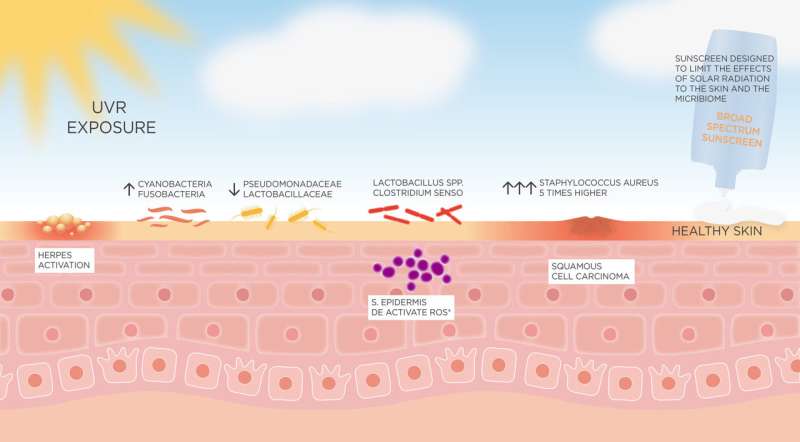This article has been reviewed according to Science X's editorial process and policies. Editors have highlighted the following attributes while ensuring the content's credibility:
fact-checked
peer-reviewed publication
proofread
Study explores the sun's effects on the skin microbiome—it can create a damaged skin barrier

The impact of solar radiation on skin has long been understood but what about UV's effects on our skin's hidden world—its microbiome?
An article in Photochemistry and Photobiology delved into existing knowledge on solar radiation's impact on the skin microbiome and proposed innovative sun protection methods that safeguard both skin integrity and microbiome balance.
Experts offered insights into novel sun protection products designed to shield the skin and mitigate the effects of solar radiation on the skin microbiome. Solar radiation exposure can alter microbiome composition, potentially leading to dysbiosis (an imbalance in the microbiome), compromised skin barrier function, and immune system activation.
Current sun protection methods generally overlook microbiome considerations. Tailored sun protection products that prioritize both skin and microbiome health may offer enhanced defense against solar radiation-induced skin conditions.
Key findings include:
- The incorporation of topical sunscreens with film-forming properties not only offers effective sun protection but also enhances the skin barrier, potentially aiding in the preservation of a healthy microbiome by reducing the penetration of harmful UV radiation and environmental stressors.
- Novel sun-protecting products containing pre and probiotics and other beneficial ingredients may potentially help to protect the skin microbiota from SR damages and help to limit the exposome-induced immunosuppression of the host.
- There is evidence that UVR destroys substances such as porphyrins which are absorbed in the long UVA range and especially in the visible range and which are produced by several microorganisms including the skin commensal Cutibacterium acnes and Pseudomona aeruginosa. Thus, UVR may impact the skin microbiome composition leading to dysbiosis and an altered skin barrier.
More information: Yolanda Gilaberte et al, Exploring the impact of solar radiation on skin microbiome to develop improved photoprotection strategies, Photochemistry and Photobiology (2024). DOI: 10.1111/php.13962
Journal information: Photochemistry and Photobiology
Provided by American Society for Photobiology





















